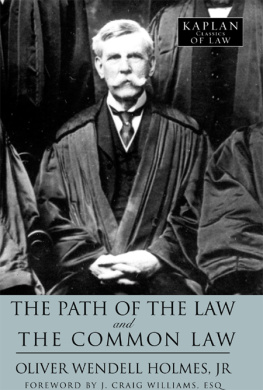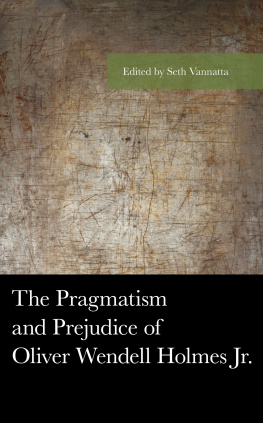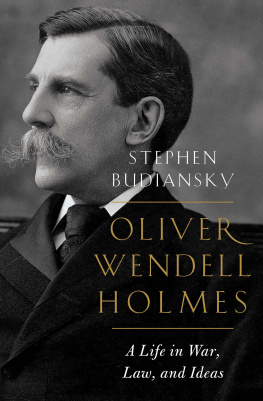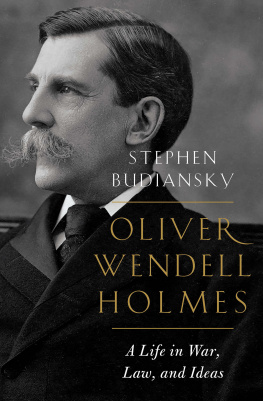Oliver Wendell Holmes - The Autocrat of the Breakfast Table
Here you can read online Oliver Wendell Holmes - The Autocrat of the Breakfast Table full text of the book (entire story) in english for free. Download pdf and epub, get meaning, cover and reviews about this ebook. year: 2011, publisher: Barnes & Noble, genre: Art. Description of the work, (preface) as well as reviews are available. Best literature library LitArk.com created for fans of good reading and offers a wide selection of genres:
Romance novel
Science fiction
Adventure
Detective
Science
History
Home and family
Prose
Art
Politics
Computer
Non-fiction
Religion
Business
Children
Humor
Choose a favorite category and find really read worthwhile books. Enjoy immersion in the world of imagination, feel the emotions of the characters or learn something new for yourself, make an fascinating discovery.
- Book:The Autocrat of the Breakfast Table
- Author:
- Publisher:Barnes & Noble
- Genre:
- Year:2011
- Rating:5 / 5
- Favourites:Add to favourites
- Your mark:
- 100
- 1
- 2
- 3
- 4
- 5
The Autocrat of the Breakfast Table: summary, description and annotation
We offer to read an annotation, description, summary or preface (depends on what the author of the book "The Autocrat of the Breakfast Table" wrote himself). If you haven't found the necessary information about the book — write in the comments, we will try to find it.
This collection of essays, published in 1858, inaugurated a series of similar books that Holmes would publish over the course of his long career. The essays are set in the dining room of a boarding house and feature one-sided humorous perorations by the otherwise unnamed Autocrat on a number of subjects from old age to conversation.
The Autocrat of the Breakfast Table — read online for free the complete book (whole text) full work
Below is the text of the book, divided by pages. System saving the place of the last page read, allows you to conveniently read the book "The Autocrat of the Breakfast Table" online for free, without having to search again every time where you left off. Put a bookmark, and you can go to the page where you finished reading at any time.
Font size:
Interval:
Bookmark:
OLIVER WENDELL HOLMES

This 2011 edition published by Barnes & Noble, Inc.
All rights reserved. No part of this publication may be reproduced, stored in a retrieval system, or transmitted, in any form or by any means, electronic, mechanical, photocopying, recording, or otherwise, without prior written permission from the publisher.
Barnes & Noble, Inc.
122 Fifth Avenue
New York, NY 10011
ISBN: 978-1-4114-3585-8
EVERY MAN HIS OWN BOSWELL
I was just going to say, when I was interrupted, that one of the many ways of classifying minds is under the heads of arithmetical and algebraical intellects. All economical and practical wisdom is an extension or variation of the following arithmetical formula: 2+2=4. Every philosophical proposition has the more general character of the expression a+b=c. We are mere operatives, empirics, and egotists, until we learn to think in letters instead of figures.
They all stared. There is a divinity student lately come among us to whom I commonly address remarks like the above, allowing him to take a certain share in the conversation, so far as assent to pertinent questions are involved. He abused his liberty on this occasion by presuming to say that Leibnitz had the same observation. No, sir, I replied, he has not. But he said a mighty good thing about mathematics, that sounds something like it, and you found it, not in the original, but quoted by Dr. Thomas Rid. I will tell the company what he did say, one of these days.
If I belong to a Society of Mutual Admiration, I blush to say that I do not at this present moment: I once did, however. It was the first association to which I ever heard the term applied; a body of scientific young men in a great foreign city who admired their teacher, and to some extent each other. Many of them deserved it; they have become famous since. It amuses me to hear the talk of one of those beings described by Thackery
"Letters four do form his name"
about a social development which belongs to the very noblest stage of civilization. All generous companies of artists, authors, philanthropists, men of science, are, or ought to be, Societies of Mutual Admiration. A man of genius, or any kind of superiority, is not debarred from admiring the same quality in another, nor the other from returning his admiration. They may even associate together and continue to think highly of each other. And so of a dozen such men, if any one place is fortunate enough to hold so many. The being referred to above assumes several false premises. First, that men of talent necessarily hate each other. Secondly, that intimate knowledge or habitual association destroys our admiration of persons whom we esteemed highly at a distance. Thirdly, that a circle of clever fellows, who meet together to dine and have a good time, have signed a constitutional compact to glorify themselves and put down him and the fraction of the human race not belonging to their number. Fourthly, that it is an outrage that he is not asked to join them.
Here the company laughed a good deal, and the old gentleman who sits opposite said, "That's it! that's it!"
I continued, for I was in the talking vein. As to clever people's hating each other, I think a little extra talent does sometimes make people jealous. They become irritated by perpetual attempts and failures, and it hurts their tempers and dispositions. Unpretending mediocrity is good, and genius is glorious; but a weak flower of genius in an essentially common person is detestable. It spoils the grand neutrality of a commonplace character, as the rinsings of an unwashed wineglass spoil a draught of fair water. No wonder the poor fellow we spoke of, who always belongs to this class of slightly flavored mediocrities, is puzzled and vexed by the strange sight of a dozen men of capacity working and playing together in harmony. He and his fellows are always fighting. With them familiarity naturally breeds contempt. If they ever praise each other's bad drawings, or broken-winded novels, or spavined verses, nobody ever supposed it was from admiration; it was simply a contract between themselves and a publisher or dealer.
If the Mutuals have really nothing among them worth admiring, that alters the question. But if they are men with noble powers and qualities, let me tell you, that, next to youthful love and family affections, there is no human sentiment better than that which unites the Societies of Mutual Admiration. And what would literature or art be without such associations? Who can tell what we owe to the Mutual Admiration Society of which Shakspeare, and Ben Jonson, and Beaumont and Fletcher were members? Or to that of which Addison and Steele formed the center, and which gave us the Spectator? Or to that where Jonson, and Goldsmith, and Burke, and Reynolds, and Beauclerk, and Boswell, most admiring among all admirers, met together? Was there any great harm in the fact that the Irvings and Paulding wrote in company? or any unpardonable cabal in the literary union of Verplanck and Bryant and Sands, and as many more as they chose to associate with them?
The poor creature does not know what he is talking about when he abuses this noblest of institutions. Let him inspect its mysteries through the knot-hole he has secured, but not use that office as a medium for his popgun. Such a society is the crown of a literary metropolis; if a town has no material for it, and spirit and good feeling enough to organize it, it is a mere caravansary, fit for a man of genius to lodge in, but not to live in. Foolish people hate and dread and envy such an association of men of varied powers and influences, because it is lofty, serene, impregnable, and by the necessity of the case, exclusive. Wise ones are prouder of the little M. S. M. A. than of all their other honors put together.
All generous minds have a horror of what are commonly called "facts." They are the brute beasts of the intellectual domain. Who does not know fellows that always have an ill-conditioned fact or two that they lead after them into decent company like so many bull-dogs, ready to let them slip at every ingenious suggestion, or convenient generalization, or pleasant fancy? I allow no "facts" at this table. What! Because bread is good and wholesome shall you thrust a crumb into my windpipe while I am talking? Do not these muscles of mine represent a hundred loaves of bread? and is not my thought the abstract of ten thousand of these crumbs of truth with which you would choke off my speech?
(The above remark must be conditioned and qualified for the vulgar mind. The reader will of course understand the precise amount of seasoning which must be added to it before he adopts it as one of the axioms of his life. The speaker disclaims all responsibility for its abuse in incompetent hands.)
This business of conversation is a very serious matter. There are men that it weakens one to talk with an hour more than a day's fasting would do. Mark this that I am going to say, for it is as good as a working professional man's advice, and costs you nothing: It is better to lose a pint of blood from your veins than to have a nerve tapper. Nobody measures your nervous force as it runs away, nor bandages your brain and marrow after the operation.
There are men of esprit who are excessively exhausting to some people. They are the talkers that have what may be called jerky minds. Their thoughts do not run in the natural order of sequence. They say bright things on all possible subjects, but their zigzags rack you to death. After a jolting half-hour with one of these jerky companions, talking with a dull friend affords great relief. It is like taking the cat in your lap after holding a squirrel.
Font size:
Interval:
Bookmark:
Similar books «The Autocrat of the Breakfast Table»
Look at similar books to The Autocrat of the Breakfast Table. We have selected literature similar in name and meaning in the hope of providing readers with more options to find new, interesting, not yet read works.
Discussion, reviews of the book The Autocrat of the Breakfast Table and just readers' own opinions. Leave your comments, write what you think about the work, its meaning or the main characters. Specify what exactly you liked and what you didn't like, and why you think so.










